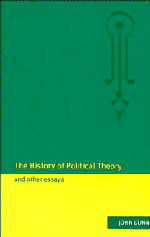Book contents
- Frontmatter
- Contents
- Preface
- Acknowledgements
- 1 Introduction
- 2 The History of Political Theory
- 3 Contractualism
- 4 Political obligation
- 5 Trust
- 6 The claim to freedom of conscience: freedom of speech, freedom of thought, freedom of worship?
- 7 Property justice and common good after socialism
- 8 The dilemma of humanitarian intervention: the executive power of the Law of Nature, after God
- 9 Specifying and understanding racism
- 10 Political science, political theory and policy making in an interdependent world
- 11 Democracy: the politics of making, defending and exemplifying community: Europe 1992
- 12 Is there a contemporary crisis of the nation state?
- 13 Political and economic obstacles to rapid collective learning
- 14 The heritage and future of the European left
- Index
14 - The heritage and future of the European left
Published online by Cambridge University Press: 05 February 2010
- Frontmatter
- Contents
- Preface
- Acknowledgements
- 1 Introduction
- 2 The History of Political Theory
- 3 Contractualism
- 4 Political obligation
- 5 Trust
- 6 The claim to freedom of conscience: freedom of speech, freedom of thought, freedom of worship?
- 7 Property justice and common good after socialism
- 8 The dilemma of humanitarian intervention: the executive power of the Law of Nature, after God
- 9 Specifying and understanding racism
- 10 Political science, political theory and policy making in an interdependent world
- 11 Democracy: the politics of making, defending and exemplifying community: Europe 1992
- 12 Is there a contemporary crisis of the nation state?
- 13 Political and economic obstacles to rapid collective learning
- 14 The heritage and future of the European left
- Index
Summary
To inherit, one must be alive. The heritage of the European left dependsnot merely on its own past but also, and intractably, on its own future. Inheritance is not a naturally grateful category for the left, as it would be,for example, for a feudal aristocracy. The left cannot hope to draw itslegitimacy essentially from its past, however grand or inspiring that pastmay sometimes have been. Indeed it is in evident danger of being supplantedas soon as it attempts at all strenuously to do anything of the kind. In the organized routine politics of the modern capitalist democracy, themost immediate threat which the left at present faces is having this heritageniched from it by more agile, more locally perceptive and lessencumbered antagonists. The key question which confronts theEuropean left for the moment is not what its short-term prospects mayprove to be, here or there, within the routine politics of individual states orthe EEC or in wider arenas, it is whether it really has a distinctive future ofits own at all, whether it can hope to remain alive and to reproduce itselfeffectively as a political force across the generations to come.
In the nature of the case, short-term prospects in routine politics aremassively contingent: predicated on the timing of electoral cycles, on thefactional stability or instability of immediate enemies and on their recenttriumphs or debacles. Such prospects are drastically affected by raw political skill or nerve, and even more drastically affected by sheer luck. This is not, of course, to say that they are inconsequential.
- Type
- Chapter
- Information
- The History of Political Theory and Other Essays , pp. 219 - 228Publisher: Cambridge University PressPrint publication year: 1995



